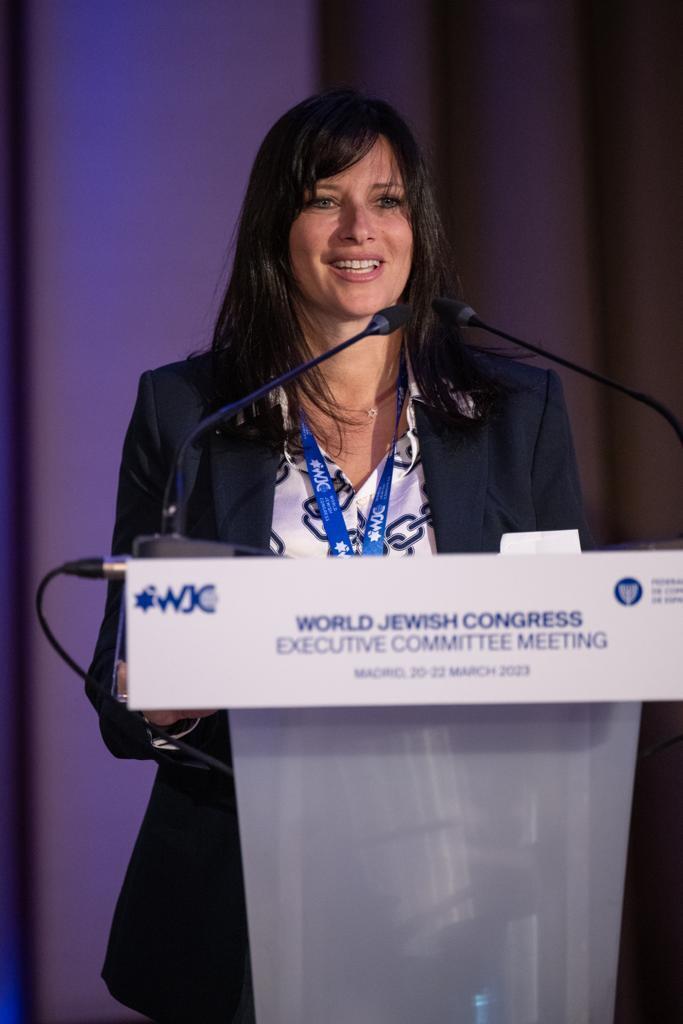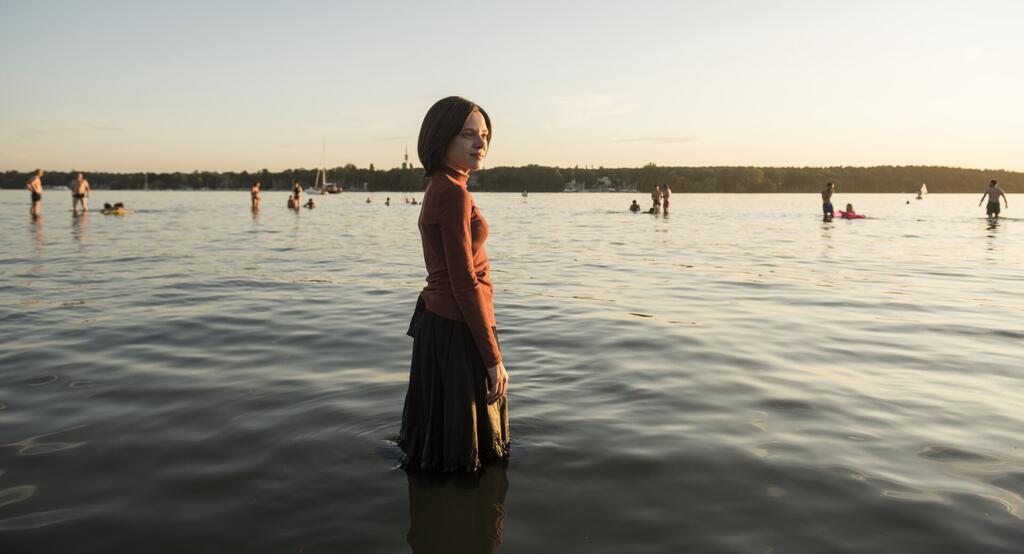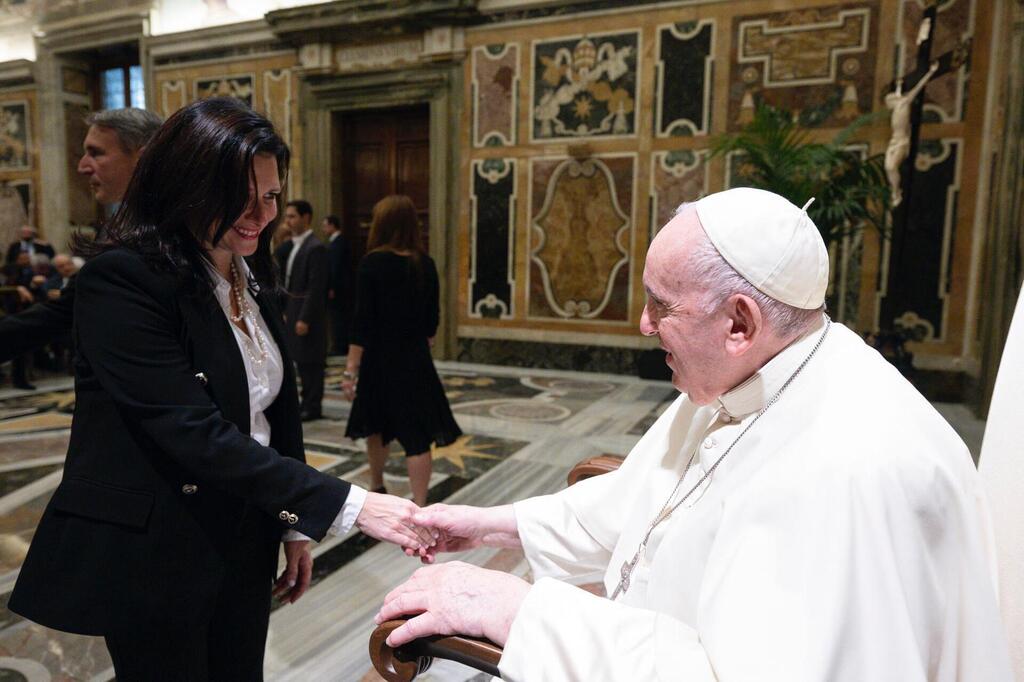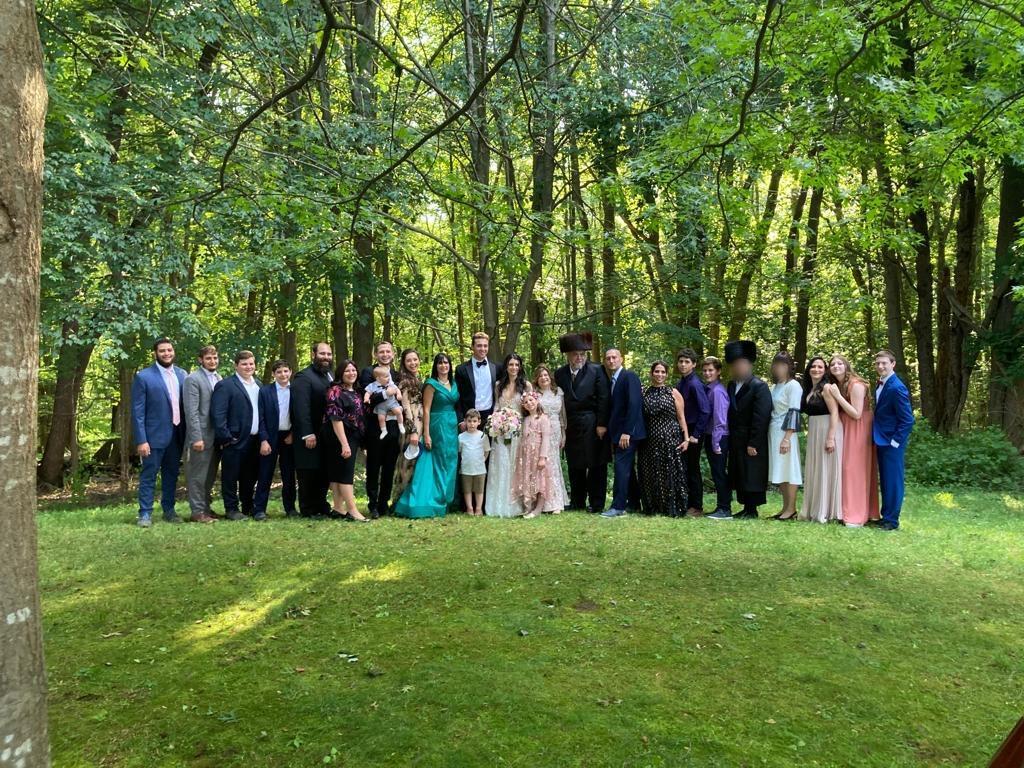Getting your Trinity Audio player ready...
How does one move from one of the most insular Hasidic sects to a position of influence among politicians in the United States? Sara Friedman, 45, has an extraordinary life story, involving a journey from an ultra-Orthodox home in Brooklyn to a prominent position at the World Jewish Congress.
Read more:
“I was born in a Hasidic home belonging to Ger in Boro Park, Brooklyn, New York. When I turned 12, we moved to Monsey, in Rockland County, New York. At the age of 17, I was married, and by 18, I was already a mother to my son Menahem, who is now 27 and lives in Ra'anana, married, and a father of a three-year-old boy. Then, at 20, my daughter Nikki was born, now 25 years old and a mother to a five-month-old baby in Englewood, New Jersey,” she recounts. “That year, my father, who had kidney disease, passed away. He was only 42 years old. It was an extremely difficult period for my mother, and she had to take time off. As the eldest daughter in a family of five children, we took my younger siblings to our home.”
Not an easy task for a young couple.
"I found myself all at once becoming a mother of six, but I didn't complain. Let’s put it this way, despite the pressure, that's not what the divorce was about."
In 2005, just before her 28th birthday, Sara and her husband divorced. “To this day, I give my ex-husband enormous credit for handling the situation well.”
How did you manage to climb to a key position in one of the largest Jewish organizations in the world?
“After my divorce, all I wanted was to break free from the bubble of the community where I’d lived my whole life. During that time, I reconnected with an older cousin who introduced me to activities supporting Israel. Initially, I got involved in an organization he founded, and later as he became a leading fundraiser for the pro-Israel lobby, AIPAC. With his support, I volunteered for various organizations that he was active in, and we attended numerous events dedicated to supporting Israel. One of those events was an Israel Bonds reception for young leaders. It was there that I had the opportunity to meet Israel (Izzy) Tapoohi, the president of Israel Bonds at the time, along with government officials. Within minutes of meeting him, I was offered a position to work in the organization.
“In financial terms, it wouldn’t have been the best decision for me, and I immediately responded that it wasn’t for me. I said: ‘I'm in real estate. I’m doing quite well and I'm happy.’ However, for three weeks, they persisted, presenting every possible argument to get me to agree. Eventually, I realized that opportunities of this kind don't come along every day, and it also aligned well with my desire to contribute to the State of Israel. So, I decided to give it a shot. I started as the director of business development, first in the United States and later in Israel and Europe. Later, I received a call from the office of the president of the World Jewish Congress, Ronald Lauder, inviting me to work with him.”
'I was busy raising my children'
Today, as senior professional of the World Jewish Congress, overseeing community engagement and serving as the Chief Marketing Officer, she collaborates closely with the organization's president and team members. Additionally, she engages with leaders from Jewish communities worldwide and various governments. “We create and implement programs that unite and strengthen Jewish communities globally. We put significant effort into combating antisemitism and working with governments to encourage them to pass laws that preserve the memory of the Holocaust,” she says. “At the same time, we collaborate with local community leaders to advocate for legislation to ensure the safety of Jews. This is such important work right now, in view of the alarming surge of antisemitism in the United States, for the first time in history President Biden established a special task force to address this issue. That is also why we collaborate with local leaders to support the enactment of relevant laws.”
Apart from this, Sara is also involved in marketing and fundraising efforts. Her responsibilities include a diverse range of topics, necessitating frequent travels across the US and abroad to meet with various leaders from other organizations.
“When my daughter posts in support of Israel, it's frightening to see the huge number of negative reactions she receives. They threaten to murder her, rape her and other crazy things”
As a young girl from Boro Park, did you dream of making an impact and seeing the world?
“My younger self couldn't have imagined Israel as I know it today, with all its complexities, except of course for the fact that it is the homeland of the Jewish people. People often ask me if I am living my childhood dream or if my job today is the realization of what I dreamed as a child, and I reply that the life I am now leading is beyond my wildest imagination back then. I didn’t have grand ambitions. I was a girl completely busy with life. With raising my children. Today, I serve as a mentor to women in the Haredi community who choose to remain within it, but from a place of empowerment and strength. When you grow up in the Haredi community, you are not programmed to be strong and independent. Think about it, there are still communities in the U.S. that speak only Yiddish.”
How would you describe yourself today?
“As a traditional Jewish woman. I eat out but keep a kosher kitchen at home so that everyone feels welcome. We make sure to have Shabbat dinners on Friday night. Tradition has always been important to me. From the age of 27, after I decided to stop wearing a wig, things happened gradually. Without anger. The children would visit their father on weekends, and I would remain alone, so what would I do? I’d turn on the TV. I gradually let go of strict observance of Jewish law and keeping Shabbat. At first, I was afraid I would be struck by lightning or be involved in a car accident, but nothing happened.”
She recalls a scene from the Netflix series Unorthodox and laughs. “The actress Shira Haas walks into a lake fully dressed, removes her wig in the water, gazes at the sky and takes a deep breath. I remember that same liberating feeling when I removed my wig for good. I simply started to breathe. I then reflected on my grandmother whom I admired so much and who had a strong impact on my life. I recalled how she would take me together with my grandfather to the Conservative synagogue of Holocaust survivors, where men and women sat together in the sanctuary. We would spend a lot of time in restaurants, and I looked at her in admiration as she joked with the waiters after all of the pain she had endured. She was a real force of nature. My father was a kind of Baal Tshuva whose father sent him to a yeshiva, which is how he became a member of the Ger Hasidic dynasty. The members of my grandfather’s entire family, who perished in the Holocaust, were also from the Ger sect, and as far as he was concerned, he was fulfilling a kind of unwritten will to do something for them. So I was not completely blind to other ways of life, even though my mother and father came from very hasidic families.
'Primarily an Israeli'
The dream of becoming Israeli was realized when she made Aliyah to Israel. “Aside from my right to vote, which I definitely exercise, I see myself primarily as an Israeli. The fact is that my eldest son also chose to live here and start his own family. Israel is where I work, where most of my friends reside. My life and my heart are in Israel. When my son volunteered in a summer camp in Israel named after young terror victim Kobi Mandel, which supports children bereaved by terror, he fell in love. He was 16 when he called me all excited and said, “Mom, this is where Jews should live.’ I thought he was joking. I answered, ‘Ah, very funny.’ When he was 19 he enlisted in the Israeli army, and went on to become an outstanding soldier, and has been there ever since. I'm very proud of him.”
Friedman says, “My friends know that no matter what, I’ll always stand up for Israel. I’ll strike up a conversation anywhere and with anyone. It happens on a daily basis and on vacations too. The most recent time was a heated confrontation while visiting friends in Nashville, with a volunteer from a humanitarian organization with a very strong pro-Palestinian agenda. This is the same organization that was involved in the incident with Scarlett Johansson, who was a presenter for SodaStream, which led to the factory's closure in the West Bank, causing many people to lose their jobs. The poor girl had no idea what hit her when I started to assail the organization and explain what is really behind it. My friends said, ‘Maybe stop and just enjoy your ice cream.’ My Israeli boyfriend simply vanished. He doesn’t like it when I get involved in these kinds of arguments,” she laughs.
"I gradually let go of strict observance of Jewish law and keeping Shabbat. At first I was afraid I would be struck by lightening or be involved in a car accident, but nothing happened”
One of the complaints Israelis sometimes have against Diaspora Jews is that they seek to influence life in Israel without actually living here.
“From my perspective as an American with an American passport, American Jews shouldn’t intervene and dictate what should happen in Israel, although there is pressure concerning the question why American Jews are not taking a stand now. I happened to be present in Tel Aviv when rockets were flying and landing all over so I get the resentment some Israelis feel. What Diaspora Jews should definitely say is: ‘We need a strong Israel, and perhaps there are ways in which Diaspora Judaism can help.’
There is a strong disconnect between Israelis and Diaspora Jews, who don’t really understand each other’s perspectives and where the other is coming from, and programs on the subject are already in the works. Beyond the financial, political and diplomatic support worldwide, many strong American Jewish organizations are working very hard to place Israel in a better position, and we want to assure that Israel will continue to exist and that you-we always have a state.”
Amid the unfolding events in Israel, she sighs and shares her concerns: "I had the opportunity to meet members of the Knesset and express how difficult the situation is for me as a Jew. As I see it, we, the Jews around the world, look at Israel as our home, and when your parents fight and the home is breaking up, it evokes fear and sadness. That is how Jews in the Diaspora are feeling these days. We don’t know what the future holds, but one thing is clear: The Jewish people need the State of Israel. I don't take any particular side, but the government and citizens must engage in dialogue and come together, for the sake of all Jews across the globe.”
"What Diaspora Jews should definitely say is: ‘We need a strong Israel, and perhaps there are ways in which Diaspora Judaism can help.’ There is a strong disconnect between Israelis and Diaspora Jews, who don’t really understand each other’s perspectives"
How do you think Israel should market itself in the world?
“I work a great deal with young American influencers and college students who handle everything on social media to promote the State of Israel and address challenging questions that arise on social media platforms. According to them, their main difficulty is that Israel doesn't provide them with the necessary tools, and the meaning is that Israel isn't presenting itself in the most effective way. Look, there will always be haters. But there are many people who are in the middle and can be swayed to support Israel. In regard to them, we are convinced that if the Israeli government provided the necessary resources or if the Israeli government invested in them, they would wholeheartedly support Israel.
“In my view, it's crucial to prioritize young Americans since they will be the leaders of tomorrow. We should reach out to them and ask them what they need and offer our support to help them achieve their goals. They are the ones on the frontline, fighting this battle, and without the proper tools, they will be simply overwhelmed. When my daughter, who is a social media influencer herself, posts in support of Israel, and it's frightening to see the huge number of negative reactions she receives. They threaten to murder her, rape her and other crazy things.”
She is concerned about a growing number of young Jews who feel disconnected from Israel and lack a sense of obligation to support it. “Ultimately, these young people will be the ones voting, and the troubling question is what will happen in a decade or so when they are holding key positions or become leaders? If we fail to bridge the gap between these young people and the State of Israel and the wider Jewish community, we will face serious challenges.”
When Friedman is in Israel, she lives in Tel Aviv, and has been in a relationship with an Israeli lawyer for four years. He was born in Bnei Brak to a Haredi family but chose to leave the religious lifestyle. When speaking about memories of her father's home, she becomes emotional. “I miss the Friday evenings and the holidays. My favorite was the Sukkot holiday with all the decorations. My father brought so much joy and laughter into our home," she reminisces. “I miss my grandmother’s warm energy. I try to carry this joy into my own world and into my own home, and in between, I endeavor to advocate and do good for the State of Israel. This is my life's mission.”





